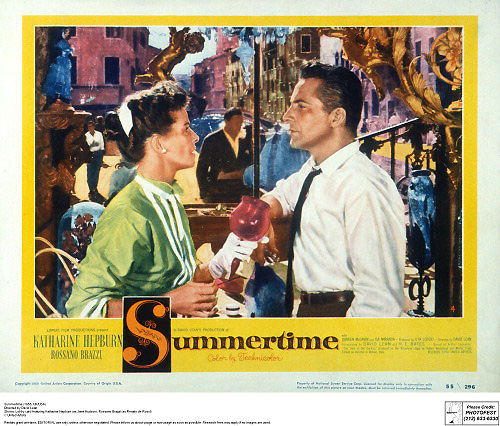
Summertime (1955, UK/USA)
Directed by David Lean
Shown: Lobby card featuring Katharine Hepburn (as Jane Hudson), Rossano Brazzi (as Renato de Rossi)
Movies and travel often evoke similar emotions. Each can transport us to other times and other places. Nowhere in film genre is this more evident than in the ‘romantic travel movie’, where the exotic setting can play a fickle cupid to those who cross cultures and times zones in quest of true and lasting love.
On the movie screen Rosano Brazzi is leaning out as far as he can from the side of a little canal in Venice. The Italian tenor-matinee-idol of the 1950s –remember “sahm een-CHAHNTed EEEfff-ning . . .”?—is straining to retrieve a gardenia that was accidentally dropped from a nearby bridge by Katherine Hepburn. Try as he might the flower evades his grasp and he looks up at Kate with a sad smile and an Italic shrug of resignation as it floats away. That elusive flower prefigures the moment of truth in the film Summertime. Brazzi plays the proprietor a small shop that sells gaudy Venetian glass on a little piazza beside a canal. Hepburn is a somewhat skittish American schoolteacher on her summer break first-time trip to Italy, and arguably on the downslope toward what used to be uncharitably called “spinsterism”. You just know that they must fall in love: it’s Venice, it’s tourist season, the soundtrack oozes Vivaldi and Rossini, there’s even a cute little Italian boy to play the cupid go-between. You could watch this movie in reverse with Polish subtitles and still figure it out in three scenes. But keep going.
Summertime displays all the essential ingredients of the Romantic Travel Movie. Brazzi bought Hepburn that gardenia in Piazza San Marco, with its people, pigeons, and ‘people-pigeons’ being overcharged for cappuccino and sappy music coming from the Florian café. He’s dashing, with a dash of vulnerability; she’s vulnerable with more than a dash of Midwestern schoolmarm protective skepticism. It’s a match made in a heavenly casting office, with all the dramatic tension of different cultures coming together on some of the most compellingly romantic urban turfs anyplace in the world. Summertime, under David Lean’s sublime direction, is the “classic” romantic travel movie.
But that elusive flower, sold by to Brazzi by an old woman flower-seller who muttered something enigmatic about “amore” sets us up for the inevitable “so just where is ‘happily ever after’ going to be?” What happens when the summer trip is over? Shall we live in Venice, or Ohio? Some choice. The corollary to the axiom that “you can’t go home again” is, in the RTM, often: “but you must go home again.”
If you haven’t seen Summertime, rent it, this won’t spoil the ending for you. But the gardenia comes back into it, this time in a train station scene, another regular feature of many romantic travel movies, at least the 1950’s vintage. In any event, with Lean’s camera directions it doesn’t matter whether we fall in love with Hepburn or Brazzi, because this movie is where I first fell in love with Venice. Much in the way that the city’s favorite son vedute painter, Antonio Canale (Canaletto), painted it in virtually every kind of light he could find it, Lean’s camera evokes a city that hovers somewhere between reality and an otherworldly dream. If you can fall in love in Venice, or with Venice, you need your heart checked.
Summertime is my favorite romantic travel movie, but one can get a good argument from aficionados about what film is the best of this genre. As with romance itself, preferences are nothing if not highly subjective. The younger generation might prefer something like the bitter-sweet Out of Africa (1985) though the leads played by Meryl Streep and Robert Redford might seem too worldly and tormented, and Kenya’s lion-prowled savannas hardly serve as an easy place for a romantic picnic or strolling hand-in-hand. Or, Before Sunrise (1995), Forget Paris(1995), or an old reliable Italy, Under the Tuscan Sun (2003). But, for me, Summertime is the gold standard, a film that also meets my standard for my personal “classics” list of one I would watch again and again because you don’t have to fall in love with Hepburn or Brazzi, you have Venice.
___________________________________
©2006, James A. Clapp (UrbisMedia Ltd. Pub. 2.11.2006)
